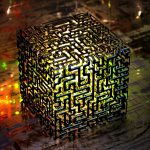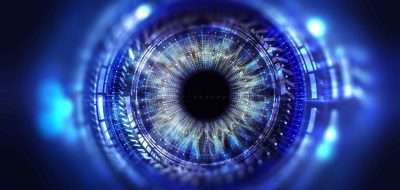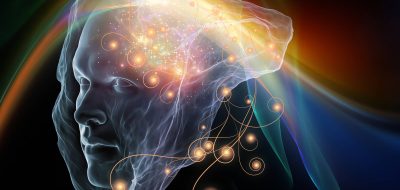Computers are used to solve problems, and the type of problems they solve depends on their algorithms and hardware as well as their capabilities and limitations. Imagine what would happen if you could lift these limitations once and for all? What would modern quantum computers be able to do then?
What has made quantum computers so exciting lately? Perhaps the fact we are approaching the limits of computing capabilities of the kinds of transistor-based machines we have long been using. They are limited by the laws of physics, which prevent us from packing more processors on chipboard.
My recent article published in Data Driven Investor – link
The old transistor computer …
Today’s processors consist of billions of transistors, each a few nanometers in size, crammed onto a very small surface. According to Moore’s law, the number of transistors in a microprocessor doubles every two years. Unfortunately, computational power increases have slowed down lately. This is because we are gradually reaching the technological boundaries of how many transistors can be “crammed” onto such small surfaces. The limit, which can not be exceeded physically, is transistors reduced to the size of a single atom with a single electron used to toggle its state between 0 to 1.
… and its kid brother, the quantum computer
Quantum computing relies on the intermediate state, thus moving beyond the scheme of two opposing values. The qubit (short for quantum bit), which is the quantum unit of measure, can assume the state of both 0 and 1 simultaneously or, to be precise, take on an infinite number of states between 0 and 1. This property is referred to as superposition. Only when the value of a qubit is checked does it ever assume either of the two basic states of either 0 or 1.
While the difference seems to be minor, a superpositioned qubit can execute multiple calculation commands at a time, helped by the fundamental laws of quantum physics. Physically, a qubit can be represented by any quantum system with two different fundamental states such as an electron or atom spin, two energy levels in an atom, or two levels of photon polarization – vertical and horizontal.
This completely unreal situation becomes reality when using a quantum computer. A machine of this kind can process data even hundreds of thousands, and theoretically millions of times faster than devices relying on advanced silicon components! An ideal use for such a machine would be to recognize objects in a huge stock of photos, process large numbers, or encrypt and decrypt codes. By using mathematical data, we can theoretically increase the performance advantage of quantum over a conventional computer to 1:18 000 000 000 000 000 000 times!
Probabilistic algorithms
The creation of quantum algorithms is a big challenge as they must adhere to the laws of quantum mechanics. Algorithms executed by a quantum computer follow the laws of probability (hence, they are referred to as probabilistic). This means that if the same algorithm is run twice on a quantum computer, the randomness of the process may cause it to produce different results. Simply put, in order to generate reliable calculation results, one should apply the principles of probability.
Quantum computers are perfectly suited for specific highly-specialized calculations that rely on algorithms to harness their full power. Some of the most common applications of probabilistic algorithms are the Miller-Rabin’s test of numbers for primality (which has extensive applications in cryptography) and Quicksort, a rapid sorting algorithm. All this means that quantum computers are unlikely to appear on every desktop or in every home any time soon.
However, no matter how long it takes for a given algorithm to generate a result, we can easily imagine, even today, a scenario in which a quantum machine is needed to solve a specific problem.
Mathematics, physics, astronomy … and code-breaking
Quantum technologies can significantly affect various fields of science such as astronomy, mathematics, and physics. Quantum computers can instantly sift through mountains of data. This, in fact, maybe the main reason why intelligence agencies and tech companies invest heavily in this technology. Quantum computers could be ideal for code-breaking. Asymmetric cryptography algorithms, used as part of the system that secures web browser and mobile/online banking transmissions, could also be used to instantly break them. This is, potentially, the first technology that could threaten the cryptographic algorithms of blockchain networks and cryptocurrencies, or rather their cryptographic methods based on a pair of keys: public and private.
Despite the impressive computational power of quantum computers, they are not simply machines that can run existing software a billion times faster. Rather, quantum computers are good at solving specific types of problems.
Smarter artificial intelligence
The primary application of quantum computers could be to support artificial intelligence and, more specifically, machine learning. Neural networks, which underpin AI, need to be trained and taught specific behaviors that are based on algorithms and huge data volumes. Put very simply, faced with the choice of taking a specific action as a result of the calculations performed by an algorithm, neural networks are additionally guided by the probability of the occurrence of a specific desired outcome. As they receive feedback on whether such an outcome is indeed desirable and correct, they automatically modify their algorithms to increase the chance of taking that desired, appropriate action.
This is an example of feedback-based machine learning. In a nutshell, the action model is based on the calculated probability of many possible choices. Artificial intelligence is ideal for quantum computing, where probabilities drive the operation of quantum computer algorithms.
A good example is the startup Rigetti which designs neural networks using quantum computers. Rigetti has recently announced having designed a data clustering algorithm for quantum computers. In tests, the algorithm proved to cluster data faster than algorithms run on classic computers. The feat was accomplished on a 19-qubit quantum machine. What speeds can more advanced computers achieve? When it comes to quantum computing, the increase in computational power between 19 and, say, 30 qubits, is not linear but exponential. While many companies use quantum computers to run artificial intelligence algorithms, this example is one of the first successful attempts to make neural networks and quantum computers work together.
Scalability
Quantum computers and artificial intelligence share another common feature: huge, exponential scalability. The power of quantum computers is measured in qubits, with the most advanced quantum computers reaching about 50Q. With such power, they are equivalent to a single supercomputer. A power increase to just 60Q would produce a machine that exceeds the collective computational power of all of the world’s supercomputers.
Quantum machine learning is the latest field of research and emerging technology that attempts to harness the power of quantum computers to accelerate the performance of classic machine-learning algorithms. Even today’s AI systems with their machine learning algorithms are capable of processing incredible amounts of data. The process the algorithms used to search databases could be improved by employing quantum computing. Both such algorithms and quantum computer capabilities are expected to be available within a few years. Once they are here, the speed of neural networks will rise well beyond an ordinary surge. We will see it skyrocket, multiplied by a factor of millions.
Theoretically speaking, self-replicating artificial intelligence could scale itself with the expansion of hardware and cloud computing networks. This would allow artificial intelligence to create algorithms of a complexity that far exceeds any human creations. All to harness the full power of quantum computing.
An aerospace company is planning to use a quantum computer to test autopilot software used onboard aircraft. The latest models of behavior of the neural networks and algorithms used in such autopilots are too complex for conventional computers to handle. Quantum computers are also used to design software that can spot and mark autonomous vehicles.
We have already reached the point where AI creates new artificial intelligence without human involvement. All this thanks to quantum computers as well as the principles of quantum physics that underpin their operation.
Qubits harnessed for molecular modeling
Another example of the use of quantum computers is for precision modeling of molecular interactions to find the optimal configurations for chemical reactions. Quantum chemistry is so complex that only the simplest molecules and the simplest relationships among them can be analyzed by classical computers.
It is the computing power of computers in academic data centers that determines the accuracy with which various phenomena are simulated, often down to individual molecules. In highly complex systems, rather than relying exclusively on simplified presumptions to map interactions between molecules and molecule sets, as is the practice today, quantum computers will render such interactions mappable in environments that closely mimic real-life conditions. This will be possible thanks to the quantum nature of chemical reactions. By their very design and owing to their operating principles, quantum computers would have no difficulty simulating and evaluating even the most complex molecular processes. Molecular modeling is applied in nanotechnology, drug design, the exploration of biological structures having known sequences but unknown structures and functions, learning about the dynamics and thermodynamics of chemical compounds, and material research. The applications do not end – there is, in fact, a multitude of others. The main constraint on their development is the limited computing power of conventional computers.
In early 2018, scientists from the Institute of Quantum Optics and Quantum Information of the University of Innsbruck applied an algorithm of a programmable quantum system to simulate interactions among protein molecules. As part of an experiment described in Nature, a team of researchers used a basic quantum computer to test the impact of external factors on particular ions of a molecule. In the experiment, the external factor was an attempted alteration of molecules to create a new chemical compound. The simulation showed it was possible to modify a real-life environment in such manner and this means one can build new, stable particles. The quantum simulator worked perfectly in the experiment.
Fundamentals of cryptography for code-breaking
As quantum computers grow more powerful, common encryption algorithms become obsolete. Today, most data encryption security depends on the difficulty of factorizing (or breaking up) large numbers into primes.
To break a private key or crack an encryption method, factorization algorithms must painstakingly attempt to make divisions by successive numbers. While the task can be completed by today’s supercomputers, it would make no financial sense to use them. The estimated time that a conventional computer would need to break a 4096-bit RSA key would exceed the time that has passed since the formation of our galaxy!
This makes breaking codes and keys costly and impractical. However, a quantum algorithm would allow one to check all potential combinations simultaneously and generate the correct solution in an instant. What this means is that today’s asymmetric encryption algorithms that rely on a public and private key will no longer be secure and that other methods of securing data, transactions or system access will have to be found.
We can nevertheless rest easy. Very little has been achieved in the practical application of quantum factorization. Besides, ever more asymmetric encryption methods are being developed that will resist quantum computers’ attempts to crack them.
Quantum finance
Modern financial markets are among the world’s most complex ecosystems. Although many sophisticated mathematical tools have been developed to manage such markets, they are still far from efficient.
Asset managers responsible for investment funds can only dream of having a perfectly balanced portfolio designed for them. To rebalance their portfolios, change the proportions of their components and restore the original desired level of asset allocation, they either buy or sell assets. Let’s say that the original ratio of shares to bonds in the portfolio is 50/50. If shares in the portfolio perform well in a given period, their proportion could increase to 70%. To restore the desired 50/50 ratio, the asset manager may have to sell some shares and buy some bonds. This means incurring transaction costs. In a market where most funds only generate short-term single-digit profits, the loss of a few percents in transaction costs to rebalance the portfolio could be devastating. And the portfolio may have to be rebalanced multiple times during a reporting period.
Quantum computers may optimize investment portfolios significantly faster than the algorithms used in classic computers, not to mention humans.
At a financial conference of the Singularity University held in December 2017, the CEO of 1Qbit, Andrew Fursman said that quantum computers that rely on the most fundamental laws of nature will appear sooner than we think. One of their key applications will be in quantum finance.
Quantum weather forecasting
NOAA (National Oceanic and Atmospheric Administration) Chief Economist Rodney F. Weiher claims that nearly 30 percent of the U.S. GDP is directly or indirectly affected by weather, impacting food production, transportation and retail trade. The ability to better predict the weather would have enormous benefits in many fields.
Although reliable weather forecasting has long been the goal of scientists, the equations governing the weather contain such a large number of variables and data that classic computer simulations are unable to perform the required calculations and produce outcomes within reasonable time limits. Figuratively speaking, for the current supercomputers, the simulation of the weather forecast for the next 4 days will take three weeks. This is not a problem of having no access to data or bad algorithms, but merely of computational power. As Seth Lloyd, a researcher who applies quantum computers for weather forecasting pointed out: “Using a classic computer to perform such analysis might take much longer than it takes the actual weather to evolve”. The use of quantum computers would reduce processing time from weeks to hours.
While quantum physics in the form of quantum computers is already hugely impacting the areas listed above, you can easily imagine many other applications. Quantum technology and quantum algorithms are evolving. What will they bring? I hope a lot of good.
. . .
Works cited
Intel, Over 50 years of Moore’s Law, link, 2018.
The Guardian, Ben Tarnoff, Weaponised AI is coming. Are algorithmic forever wars our future?,link, 2018.
Science Alert, Dawid Niels,Google’s Quantum Computer Is 100 Million Times Faster Than Your Laptop, link, 2018.
DI Management, RSA Algorithm, link, 2018.
NOAA, National Oceanic and Athmospheric Administration,link, 2018.
Bae Systems, Taranis,link, 2018.
DARPA, Faster, Lighter, Smarter: DARPA Gives Small Autonomous Systems a Tech Boost, Researchers demo latest quadcopter software to navigate simulated urban environments, performing real-world tasks without human assistance,link, 2018.
. . .
Related articles
– Technologies that will change 2019
– Will quantum computers doom the blockchain?
– Artificial Intelligence for big players only
– Blended worlds. Welcome to augmented reality
– Who will gain and who will lose in digital revolution?













Acula
Good post
Mac McFisher
Great post Norbert Biedrzycki and thanks for sharing
Norbert Biedrzycki
Thank you
John McLean
I was just reading about quantum computing the other day on LinkedIn, though they had the opposite opinion! Great to get both sides.
Karel Doomm2
Good post and good article!
Can you imagine that not so long ago the Nobel Prize was awarded for the invention of the transistor, today we have quantum computers and work on even more modern ones?
Why not to interfere in a single cell using this tool?
Maybe we will discover a programmed prototype from the theory of Panspermy – about an origin of life in the Universe.
Only the wording of thoughts or wishes will remain?
Thank you for sharing.
Norbert Biedrzycki
Thank you
CaffD
Part of this will depend upon the moral context in which advances occur. Will the drive towards the techological singularity over ride the moral question of whether or not we should go down this rabbit hole?
Tesla29
If quantum computer take a “real body” we will have a serrius problem with security. A “quantum logic” will supersede the World “classic logic”. Just like Shrodinger’s cat changed our perception, in the same way we will be able to remodel/redefine the security hacking problems in “quantum logic” – to prepare “quantum cyber attack”
Jack666
We should be aware over certain things that we shall consider it, for example the reduction of our privacy, the continuous surveillance (like in China) or the judgment of your behaviour by a robot deciding if you earn some points to be a good citizen.
You will be almost forced to use a chip in order to get access to medical services and pay your bills, without this device… it would be like you don’t exist and you won’t be able access to any services in the city, get a job or even rent a place to live. Dissidents will be prosecuted.
What about “hybrids” ? Could hackers hack our brains in the future?
And all that without mentioning the replacement of humans by machines in nowadays jobs.
Advanced AI can learn and evolve by themselves and even develop a personality, what could be the worst-case scenario on this? The rise of machines and the extinction of the human race because an AI deduced humans are a menace to the planet?
TomCat
It solves a very important problem, that of having electronic cash that operates independent of human actions and, as such, is immune to corruption and disaster. As an example, if we suddenly got into a weird situation where the dollar suddenly lost its credibility – suppose for example a war/catastrophe situation, or perhaps criminal activity managed to print billions uncovered – then Bitcoin would look more attractive to you.
Of course, Bitcoin is like having your nose unclogged, you don’t really give that any value until you get a cold. If the system works and dollar stays stable forever, then, indeed, perhaps Bitcoin will never have any use. But don’t act as if it doesn’t solve a quite important problem.
Acula
No, they won’t let us defy the laws of physics.
The current written laws of physics are just theories. If something that we see works differently than written laws of physics then that means written laws are written wrongly.
I wonder why people when facing situation that is different to their expectations tries to defend their theories as TRUTH and says:
That’s accidental case.
That’s defy laws of physics/nature/business/marketing/….
That’s …
TomCat
There have been failures–bad failures–in exchanges, contracts, etc. Well, surely that’s to be expected. The move to an encrypted internet was not exactly problem-free either. Technology is only perfected with time. Nothing ships bug-free. Many of the exchanges that were badly hacked started up as underfunded side projects in a world where they handled a few thousands of dollars of transactions a day. Take the most famous example: MtGox was a tool written by one dude in PHP to trade “Magic: The Gathering” cards, repurposed to trade bitcoin, which all of a sudden surged in value from a fraction of a cent to dollars, then hundreds of dollars. How secure would you expect it to be?
John Macolm
Good post Norbert